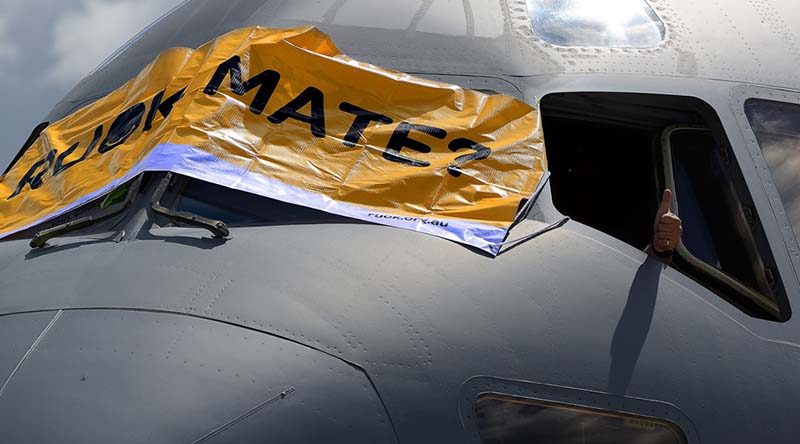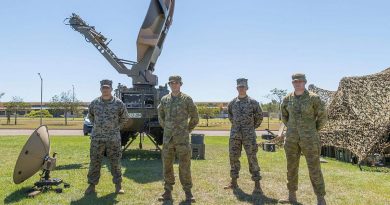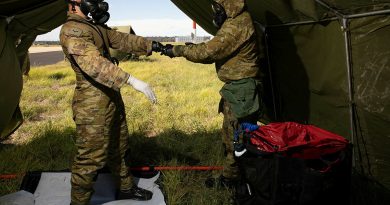Government response to National Mental Health Commission review
Share the post "Government response to National Mental Health Commission review"

Minister for Veterans’ Affairs Dan Tehan says the Government is delivering improved mental health support for current and former Australian Defence Force personnel and their families.
FILE PHOTO: A thumbs up is given as a banner is placed across the front of an Air Force C-17A Globemaster aircraft to show support to mental health awareness on R U OK? Day at RAAF Base Amberley. Photo by Peter Longland.
The Minister’s press release goes on to say…
The Government today outlined the work it is doing on mental health and suicide prevention in its response to the National Mental Health Commission (NMHC) Review into the Suicide and Self Harm Prevention Services available to current and former serving ADF members and their families. The government’s response is available here.
The NMHC review helped inform the Government’s action on veterans’ mental health in this year’s Budget, which included an additional $58.6 million in mental health funding.
The Government will now pay for the treatment of all mental health conditions affecting anyone who has served one day in the full-time ADF. This program is fully funded and uncapped. If an eligible veteran needs treatment the Government will pay for it.
The Government will provide a further $8.5 million to expand eligibility for the Veterans and Veterans Families Counselling Service (VVCS) to cover partners and children of current and former ADF members who have had one day of full-time service. Importantly, this now includes ex-partners for up to five years after separation or while co-parenting a child.
Funding of $9.8 million was also provided to pilot innovative approaches to suicide prevention and enhanced support. The Mental Health Clinical Management Pilot will assess the benefits of providing intensive clinical management to help meet a veteran’s complex mental health and social needs on discharge from a mental health hospital, and a pilot expansion of the Coordinated Veterans’ Care (CVC) program will target improved support for veterans with both chronic physical and mental health conditions.
Funding of $6.9 million was provided to improve access to incapacity payments to provide targeted ongoing support for veterans who are vulnerable to financial and employment insecurity due to the episodic nature of their mental health conditions.
The NMHC recognised the importance of a smooth transition from the ADF to post-service life. Defence and the Department of Veterans’ Affairs (DVA) are working closely together to improve that process.
The first stage of the Early Engagement Model (EEM) commenced in December 2016, with the first 5000 new and separating members registered. The aim of the EEM is that when a serving/former ADF member needs DVA in the future, they will already be registered as a client.
Improved transition services are also being rolled out to support ADF members and their families. The new support services include individual coaching and mentoring with a focus on helping ADF personnel find meaningful post-service employment.
The Government is also delivering its ‘No Discharge Without Documentation’ initiative that will ensure all separating members of the ADF leave with the necessary documents to make the transition phase more seamless.
The Prime Minister’s Veterans’ Employment Program was launched in November 2016 with the aim of helping veterans find meaningful post-service employment and assisting business recognise the unique and valuable talents of former ADF personal.
The Government agrees with the NMHC that: “continued attention is needed to ensure efforts are effective in preventing suicide and self-harm amongst Australia’s current and former serving personnel and their families”.
Part of the Government’s evolving response to mental health challenges and suicide in the current and former ADF communities is utilising data to improve our understanding of the issue and inform policy decisions.
Later this year, the Government will release the outcomes of the Transition and Wellbeing Research Programme, which is the largest study undertaken on the mental, physical and social health of current and former ADF members and their families.
The Australian Institute of Health and Welfare (AIHW) today released its second tranche of data on the incidence of suicide among current and former ADF members. Their report can be read here(http://www.aihw.gov.au/publication-detail/?id=60129559898).
These figures are the first accurate, robust data ever produced on suicide among the serving, reserve and ex-serving populations.
Starting tomorrow [1 July], the AIHW and DVA will commence a three-year strategic relationship to monitor and report on the current status and future needs of veterans and their families. This work will help us to develop a more comprehensive picture of their health and welfare, and inform future policy and services.
The AIHW study is an important part of the Government’s action on improving mental health and preventing suicide among current and former ADF.
.
.

.
.
Share the post "Government response to National Mental Health Commission review"





